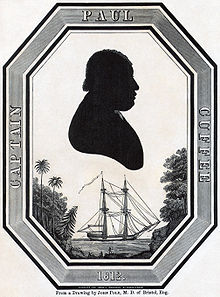Captain Paul Cuffee | |
|---|---|
 | |
| Born | January 17, 1759 |
| Died | September 7, 1817 (aged 58) |
| Resting place | Westport Meeting House |
| Spouse | Alice Abel Pequit |
| Children | 7 |
Paul Cuffe, also known as Paul Cuffee (January 17, 1759 – September 7, 1817) was an African American businessman, whaler and abolitionist. Born free into a multiracial family on Cuttyhunk Island, Massachusetts, Cuffe became a successful merchant and sea captain. His mother, Ruth Moses, was a Wampanoag from Harwich, Cape Cod and his father an Ashanti captured as a child in West Africa and sold into slavery in Newport about 1720. In the mid-1740s, his father was manumitted by his Quaker owner, John Slocum. His parents married in 1747 in Dartmouth.[2]
After Cuffe's father died when the youth was thirteen, he and his older brother, John, inherited the family farm (their mother had life rights). They resided there with their mother and three younger sisters. The following year Cuffe signed on to the first of three whaling voyages to the West Indies. During the Revolutionary War, Cuffe delivered goods to Nantucket by slipping through a British blockade on a small sailboat. After the war, he built a lucrative shipping business along the Atlantic Coast and in other parts of the world. He also built his own ships in a boatyard on the Westport River. In Westport, Massachusetts, he founded the first racially integrated school in the United States.
A devout Quaker, Cuffe joined the Westport Friends Meeting in 1808. He often spoke at the Sunday services at the Westport Meeting House and also at other Quaker meetings in Philadelphia, Pennsylvania.[3] In 1813, he donated half the money for a new meeting house in Westport, and oversaw the construction. The building still survives. Few Americans of color were admitted to the Friends Meeting at that time.[citation needed]
Cuffe became involved in the British effort to found a colony in Sierra Leone, to which the British had transported more than 1,000 former slaves originally from America. Some had been enslaved by American Patriots and had sought refuge and freedom behind British lines during the war. After the British were defeated, they took those former slaves first to Nova Scotia and London. Prodded by Black Loyalists such as Thomas Peters, who had agitated for a return to Africa, the British in 1792 offered the Nova Scotia blacks a chance to set up a colony of their own in Sierra Leone, where they resettled.
At the urging of leading British abolitionists, in 1810 Cuffe sailed to Sierra Leone to learn about conditions for the settlers and whether he could help them. He concluded that efforts should be made to increase the local production of exportable commodities and develop their own shipping capabilities rather than continuing to export freed slaves. Cuffe sailed to England to meet with members of The African Institution, who were also leading abolitionists. He offered his recommendations to improve the lives of all the people in Sierra Leone. His recommendations were well received in London and he subsequently made two more trips to Sierra Leone to try to implement them.[citation needed]
On his last trip in 1815–16, he transported nine families of free blacks from Massachusetts to Sierra Leone to assist and work with the former slaves and other local residents to develop their economy. Some historians relate Cuffe's work to the "Back to Africa" movement being promoted by the newly organized American Colonization Society (ACS). A group made up of both Northerners and Southerners, it was focused on resettling free blacks from the United States to Africa - eventually resulting in development of Liberia. The leaders of the ACS had sought Paul Cuffe's advice and support for their effort. After some hesitation, and given the strong objections by free blacks in Philadelphia and New York City to the ACS proposal, Cuffe chose not to support the ACS. He believed his efforts in providing training, machinery and ships to the people of Africa would enable them to improve their lives and rise in the world.[4]
- ^ Wiggins, Rosalind Cobb ed. Captain Paul Cuffe's Logs and Letters. Washington: Howard University Press, 1996. p.xi
- ^ Paulcuffe.org
- ^ Abigail Mott, Biographical sketches and interesting anecdotes of persons of color (printed and sold by W. Alexander & Son; sold also by Harvey and Darton, W. Phillips, E. Fry, and W. Darton, London; R. Peart, Birmingham; D. F. Gardiner, Dublin, 1826), pp. 31–43 (accessed on Google Books).
- ^ Cite error: The named reference
thomas4-5was invoked but never defined (see the help page).
© MMXXIII Rich X Search. We shall prevail. All rights reserved. Rich X Search
